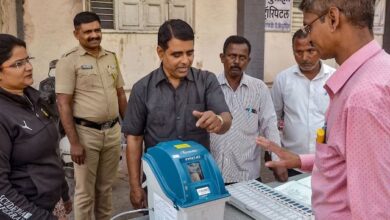High-Level Meeting Convened by Top Bureaucrats To Address Delhi’s Pollution Crisis
High-ranking government representatives came together on Friday for a key meeting to assess the ongoing pollution control initiatives in the Delhi-NCR area. The conference was presided over by PK Mishra, the Prime Minister’s senior secretary, with an emphasis on lowering stubble burning in adjacent states, a primary cause of the yearly air quality issue.
The chief secretaries of Punjab, Haryana, and Uttar Pradesh were given the go-ahead by Mishra to carefully monitor and deal with agricultural fires in their respective states. He also underlined the need of managing paddy stubble in-situ using crop residue management equipment and bio-decomposers. The conference also highlighted the financial potential of paddy straw and the necessity for appropriate infrastructure and storage facilities to enable ex-situ exploitation of this agricultural byproduct.
Along with other departmental secretaries from the ministries of the environment, agriculture, roads, petroleum, and the Central Pollution Control Board, chief secretaries from Delhi, Punjab, Haryana, Rajasthan, and Uttar Pradesh attended the conference. The purpose of this meeting was to assess the steps achieved by the task force against air pollution that was constituted in 2017.
As a result, the area’s air quality worsened, with an Air Quality Index (AQI) of 256, down from 220 the day before, and falling into the “poor” category. Due to weather variations and farmers’ custom of burning agricultural waste, the yearly fall in air quality often starts around the conclusion of the monsoon season.
The principal secretary demanded rigorous adherence to guarantee the success of the Graded Response Action Plan (Grap), which the Delhi administration has already put into action to solve the situation. The PMO statement stressed the need for increased replacement efforts for outdated cars and the rigorous adherence to Grap regulations by all relevant parties.
According to the System of Air Quality and Weather Forecasting and Research (Safar), stubble burning only contributed 1% of Delhi’s PM 2.5 concentration on Friday, down from the 2% seen on the same day last year. The contribution often stays in the single digits until late October, when harvesting peaks and it greatly increases.
Gufran Beig, the original project director at Safar, blamed local variables, notably slow wind speeds, for the present air pollution levels and said stubble burning had little effect right now. Satellite data showed that 202 agricultural fires were reported in Punjab, Haryana, and Uttar Pradesh as a whole on Friday. According to projections, the air quality was expected to remain “poor” on Saturday.
The Delhi government started spraying a bio-decomposer solution on its farmlands as part of other pollution control initiatives. Gopal Rai, the environment minister, launched this program by announcing intentions to apply the bio-decomposer to 5,000 acres of farmland this year. Thirteen teams will operate on both Basmati and non-Basmati crops.







